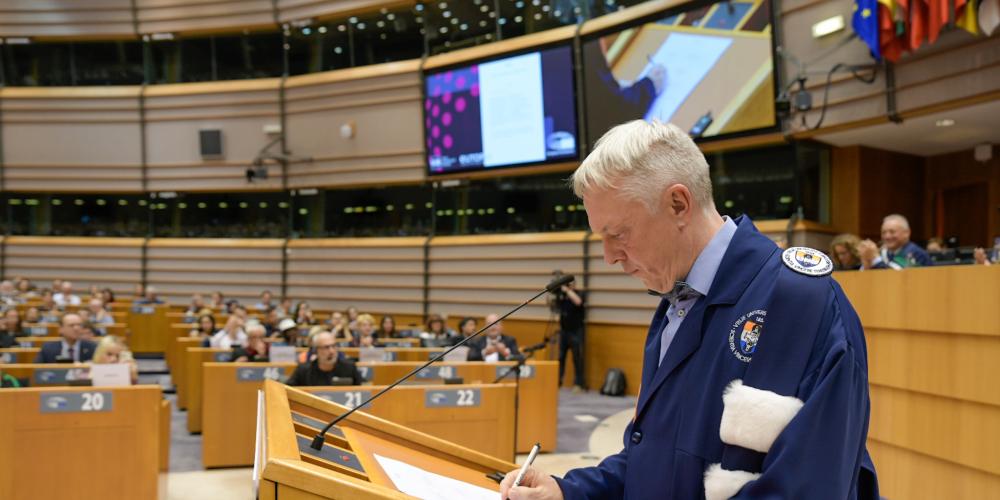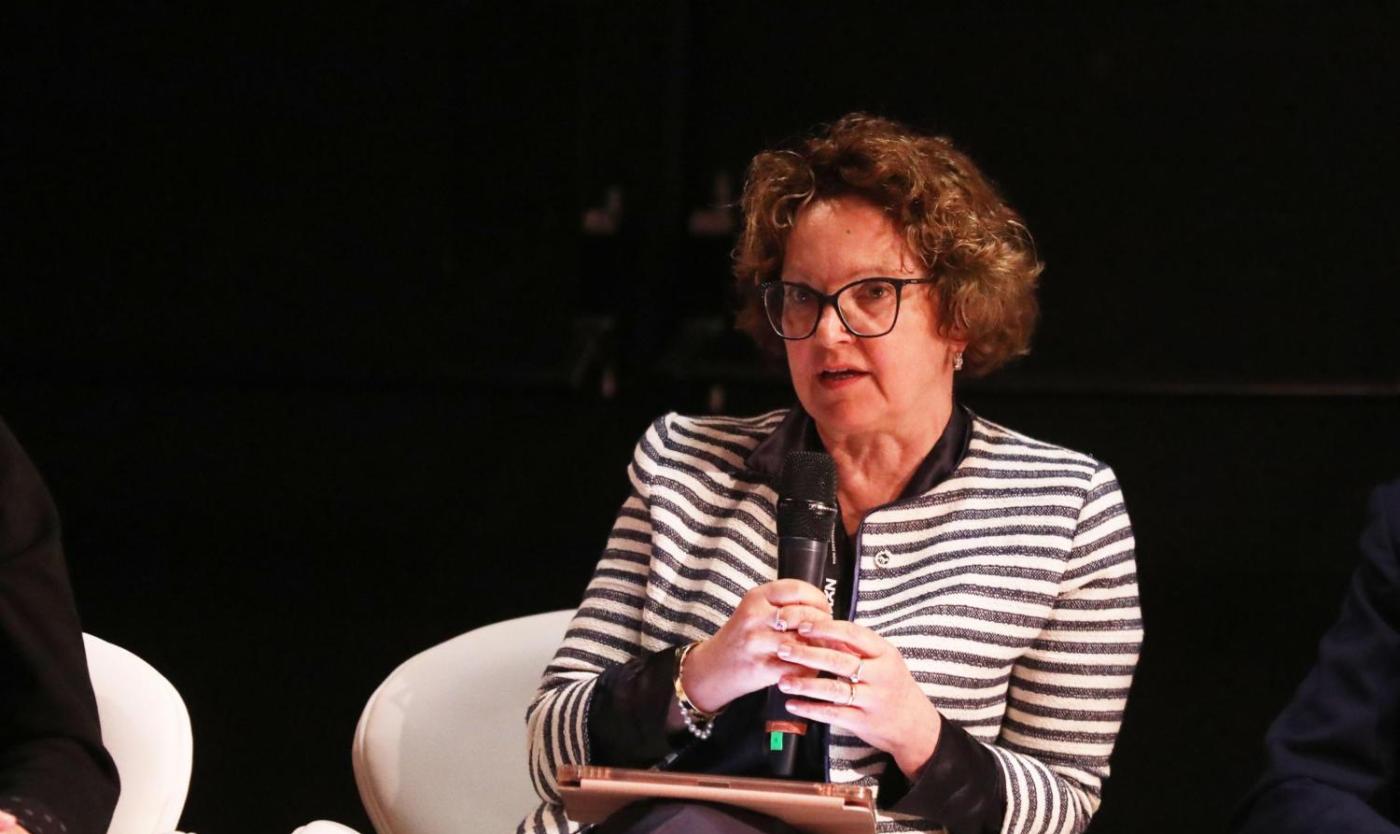
The Vrije Universiteit Brussel (VUB) opened its academic year today in a symbolic location: the European Parliament in Brussels. The opening took place alongside the nine like-minded European universities that with VUB form the EUTOPIA alliance. This collaboration model creates connected communities, or thematic networks, that allow students, lecturers and researchers to expand understanding of contemporary social challenges. Within EUTOPIA, VUB is taking the lead in developing this academic model, which can be an important weapon in the continuing battle against polarisation.
The principle is simple: students who enrol at VUB have the opportunity, via connected communities, to connect with students from the nine partner universities in nine countries. In these thematic networks, students, lecturers and scientists can work together through blended learning to find solutions to the major societal challenges of our time. The EUTOPIA collaboration model reinforces the ambitions of the alliance partners to build the European university of the future.
“As an urban engaged university, with its roots in Brussels, VUB is very familiar with the challenges of a diverse and international environment. We want to expand this on a European scale,” says VUB rector Jan Danckaert. “The EUTOPIA network acts as a catalyst for that. The alliance allows our university community to share knowledge and insights with members of the other nine university communities spread across Europe. These partner universities are not just thrown together: they have been chosen because they cherish the same values: openness, inclusion, student centredness, critical thinking and relevant, impactful teaching and research. By working together on specific projects, we can learn from each other, enrich each other, and ultimately make Europe and the world a better place.”
Towards an inclusive model for international exchange
According to Danckaert, the added value of the collaboration model lies in the way it facilitates international experiences for more members of the university community.
“Where until today only a limited number of students were able to participate in an international exchange, with a six-month Erasmus exchange, this is now an option for many more students. Our ambition is that in the long term, students in every discipline will have the chance to gain international experience.”
By creating connected communities around teaching and research, the alliance partners are encouraging their students and academics to work together on specific projects. In doing so, they are also encouraging free enquiry and critical thinking. The EUTOPIA universities aim to offer 60 such networks to their students in all scientific disciplines and training cycles by 2025.
“At VUB, we believe bringing students together across borders helps to fight the polarisation that we see every day,” says Danckaert. “They experience the local nuances of each other’s viewpoints, and are encouraged to work together in a respectful way, without prejudice or fanaticism.”
English is not necessarily the only working language: the members of the 10 universities speak at least 10 languages between them. Participants will learn to understand why smaller languages, such as Catalan at the partner university in Barcelona, are so important to the local context. This diversity is an asset for 21st-century students and lecturers.

Rector van de Ca' Foscari Universiteit van Venetië en voorzitter van EUTOPIA Tiziana Lippiello
"In de complexe wereld van vandaag worden samenlevingen geconfronteerd met ingewikkelde problemen die taalkundige, disciplinaire, nationale en culturele grenzen overschrijden. Te midden van economische stress en politieke onrust, de nasleep van COVID-19, het conflict in de Oekraïne en de trieste gevolgen van de klimaatverandering, moeten universiteiten uitmuntend onderzoek en onderwijs leveren en antwoorden en oplossingen aandragen. Universiteiten hebben een duidelijke verantwoordelijkheid als ontdekkers van nieuwe kennis en als kweekvijvers voor de volgende generatie wereldburgers. Deze inspanning vereist de ontwikkeling van infrastructuur en capaciteitsopbouw om het onderwijsaanbod te verrijken, verweven met kwaliteit, persoonlijke groei en maatschappelijke vooruitgang."
Academic opening in the European Parliament
Today, the rectors of the 10 EUTOPIA partner universities signed an agreement that gives the collaboration model a legal basis. The signing took place in the European Parliament, during the academic opening session of VUB, a founding member of EUTOPIA.
“Having VUB’s academic opening session in the European Parliament coincide with this new step for EUTOPIA has strong symbolic value for us,” says Danckaert. “It allows us to emphasise the need for universities to embrace internationalisation. Collaborations such as EUTOPIA are essential for future-proof and relevant research, teaching and innovation. That’s a message that I reinforced in my opening speech, ‘Europe, EUTOPIA, and the need for a new Renaissance’. We need an era in which people are guided by curiosity, openness and connection, with diversity the engine to transcend individual and societal boundaries. Alliances such as EUTOPIA contribute to that, and the European Parliament, the heart of European democracy, is the ideal location to deliver that message.”
Academic opening programme
- 15.00: Start of session
- Speech by chair of EUTOPIA and rector of Ca’ Foscari University of Venice Tiziana Lippiello
- Speech by EUTOPIA student representatives
- Opening speech “Europe, EUTOPIA, and the need for a new Renaissance” by VUB rector Jan Danckaert
- Signing of EUTOPIA agreement by rectors of the 10 partner universities
- Speech by Sophia Eriksson Waterschoot, Director for Youth, Education and Erasmus+ at the European Commission
- Speech by rector of the College of Europe and former High Representative of the EU for Foreign Affairs and Security Policy, Federica Mogherini
- 16.45: Start of reception
Partners EUTOPIA-netwerk
Naast de VUB maken volgende universiteiten deel uit van het EUTOPIA-netwerk: Babes Bolyai University (Roemenië), Ca'Foscari Venice (Italië), CY Cergy Paris Université (Frankrijk), Technische Universität Dresden (Duitsland), University of Gothenburg (Zweden), University of Ljubljana (Slovenië), NOVA Lisboa (Portugal), Universitat Pompeu Fabra Barcelona (Spanje) en University of Warwick (Verenigd Koninkrijk)
Meer info en contact